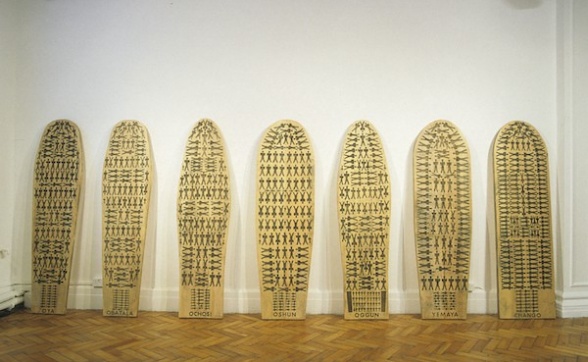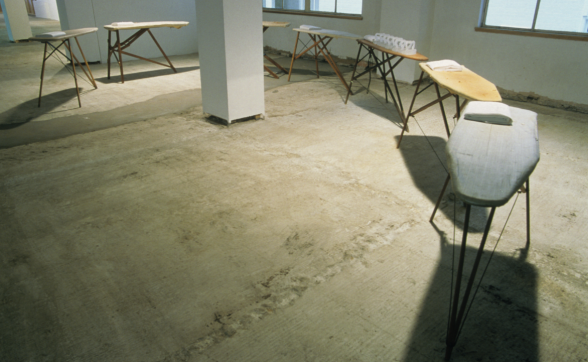Maria Magdalena Campos-Pons

Maria Magdalena Campos-Pons, The Seven Powers by the Sea (installation view), 1992-99

Maria Magdalena Campos-Pons, Unfolding Desires (installation view), 1997
Maria Magdalena Campos-Pons, The Seven Powers by the Sea (installation view), 1992-99
Maria Magdalena Campos-Pons (b. 1959, Matanzas, Cuba) has made the journey from Cuba to America, continuing the displacement begun when her Yoruba ancestors were shipped from Nigeria as slaves. Her work traces the histories of people for whom the past is not as distant as we might like to think. Campos-Pons’s grandfather was transported to Cuba to work on the Vega sugar plantation and her family was still living and working on the plantation when she was growing up. With an oral tradition that kept their connection to Africa very much alive, the artist’s friends and family were a living testament to this history of displacement.
Her work for TRACE entitled The Seven Powers by the Sea (1992) was based on templates for the stowing of slaves on the transport ships that once sailed from West Africa to the Caribbean after trading manufactured goods brought from Liverpool. The layout of the bodies on the slave boards was a powerful image of the conjunction of mathematical efficiency and brutality. Maria Magdalena Campos-Pons also used photography, film and video in her work.
At Bluecoat Arts Centre the seven slave boards were leant against the wall, evoking the Yoruba deities transposed to the new world. On the floor in front of them texts and small framed photographs of African Cubans were arranged in groups like family photographs. There was a further suggestion of headstones or silent memorials to the generations uprooted and separated by the slave trade.
Her second piece, Unfolding Desires (1997), comprised seven old wooden ironing boards placed in a spiral arrangement, each stacked with neatly folded white sheets. The worn and chipped boards retained the traces of many years of repetitive domestic labour while the shape and rhythmic arrangement of the boards suggested transatlantic passage. This piece also included two monitors installed flush with the wall. Like the photographic mementos in The Seven Powers by the Sea (1992), the images on the monitors recorded and commemorated the descendants of those displaced by slavery.
Maria Magdalena Campos-Pons at Liverpool Biennial 1999
The Seven Powers by the Sea, 1992-1999
Stained wood (sugar pine)
Exhibited at Bluecoats Arts Centre
Unfolding Desires, 1997
Ironing boards, sheets, cast glass irons
Courtesy of the artist
Exhibited at Bluecoats Arts Centre
Supported by
Vancouver Art Gallery Acquisitions Fund
Liverpool Biennial
55 New Bird Street
Liverpool L1 0BW
- T +44 (0)151 709 7444
- info@biennial.com
Liverpool Biennial is funded by
Founding Supporter
James Moores